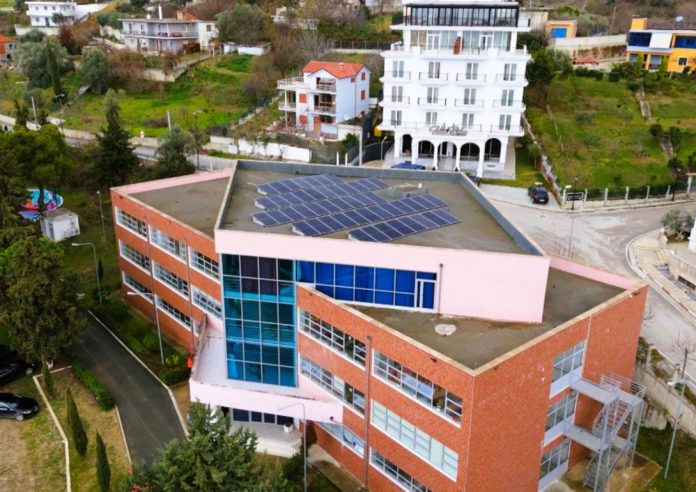“I was amazed when I learned how solar panels can change our approach to the environment and the economy. I didn’t know that solar panels can not only justify purchasing costs, but their use is also ecological. We too can have a small positive impact in the fight against climate change and that is important,” says Marinela Tafa, a 17-year-old student at “Charles Telford Erickson” High School in Kavajë, 50 kilometers southwest of Tirana.
She is one of 23 students from the school who have participated in training and seminars on renewable energy systems and energy consumption savings. While the building was rebuilt thanks to the support of the “EU4Schools” program, the “EU4Municipalities” program supported the installation of solar panels on the terrace of the “Charles Telford Erickson” agricultural vocational education school, inaugurated a few weeks ago.
The school’s principal, Matilda Çanaku, explains that the solar panels will reduce the energy consumption of the facility by 90%. “So far, almost 20% of our annual budget was spent on energy. After the installation of the solar panels, we will spend less energy and less money on energy, using the budget for other needs in the school,” she says.
“The installation of solar panels at the vocational high school in Kavajë will cover about 90% of the school’s energy needs or around 450,000 lek/year in monetary value. The amount of carbon dioxide reduced by the installation of solar panels will be 12 tons of CO2 per year,” according to calculations by Meivis Struga from the Institute of Environmental and Territorial Management (ETMI), an organization supporting sustainable development and the environment.
170 students and teachers from the schools directly benefit from this energy efficiency initiative in Kavajë, creating new pathways towards future energy sources. The project contributes to the improvement of municipal services through the advancement of the EU green agenda and addressing climate change in the municipality of Kavajë.
“By embracing these advancements, we not only mitigate the environmental impact but also pave the way for economic growth and social well-being. Local governments play a crucial role in this transition, as they oversee a significant portion of emissions and have the power to implement impactful policies. Globally, according to recent studies, local governments are responsible for up to 70% of global greenhouse gas emissions and can potentially reduce emissions by 19% through effective climate actions and energy efficiency measures,” emphasizes Elton Stafa from the “EU4Municipalities” program in Albania.
The Head of Cooperation at the EU Delegation to Albania, Hubert Perr, emphasized that the project has been a unique opportunity to engage with students and farmers to raise awareness and build skills for renewable energy systems, smart irrigation, and water management. “It contributes to the development and implementation of the municipality’s Green Agenda, reducing carbon emissions, providing a healthier environment for communities, and reducing municipal energy expenses, turning them into strategic and sustainable development investments,” he added.
Although this is the only school equipped with solar panels by the “EU4Municipalities” program, the 63 schools rebuilt by the “EU4Schools” program are designed with the aim of prioritizing energy efficiency.
“This includes the use of high-performance materials to ensure energy-efficient facilities. Such materials include double-glazed windows and LED lighting for both internal and external systems, as well as energy-efficient heating and cooling systems. Additionally, all buildings with high hot water demand, such as nurseries, kindergartens, and dormitories, are equipped with solar panels for hot water supply. Some facilities are also equipped with photovoltaic (PV) panels for energy production, while most other facilities are pre-equipped for future PV panel installations,” says Sokol Muçogllava, an engineer for the “EU4Schools” program.
EU4Schools
“EU4Schools” is a program funded by the European Union in response to the recovery process after the November 26, 2019 earthquake. The program is being implemented by UNDP, in cooperation with the Albanian government. It aims to support Albanian citizens in eleven affected municipalities, specifically: Krujë, Durrës, Kurbin, Kamëz, Kavajë, Tirana, Mirditë, Lezhë, Rrogozhinë, Shijak, and Vorë, in the field of education. The program aims at over 60 educational facilities, with almost more than 1 million beneficiaries, of whom 24,000 are students and teachers.
EU4Municipalities
“EU4Municipalities” is a project funded by the European Union aimed at fostering the development potential of municipalities and improving the socio-economic and environmental conditions of local communities in Albania. It supports the development of local infrastructure by providing better public services and sustainable local economic development. Additionally, one of the project’s objectives is to support strategic processes and enable local governance actors to mobilize resources to implement their plans and strategies, prioritizing community development, improving governance, and consequently, the quality of life of citizens. This program is implemented jointly with NALAS, Co-PLAN, SDC./ (July 22)
 go to the original language article
go to the original language article
